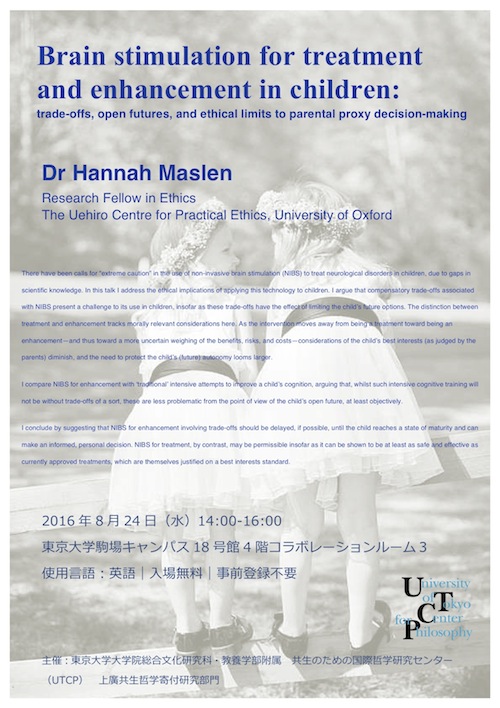
|
Title: | Brain stimulation for treatment and enhancement in childrenFinished |
||
|---|---|---|---|---|
| Date: | 14:00-16:00, Wednesday, Aug 24, 2016 |
Place: | Collaboration Room 3, 4F, Bldg 18, the University of Tokyo at Komaba |
|
Brain stimulation for treatment and enhancement in children:
trade-offs, open futures, and ethical limits to parental proxy decision-making
Dr Hannah Maslen
Research Fellow in Ethics
The Uehiro Centre for Practical Ethics, University of Oxford
There have been calls for “extreme caution” in the use of non-invasive brain stimulation (NIBS) to treat neurological disorders in children, due to gaps in scientific knowledge. In this talk I address the ethical implications of applying this technology to children. I argue that compensatory trade-offs associated with NIBS present a challenge to its use in children, insofar as these trade-offs have the effect of limiting the child’s future options. The distinction between treatment and enhancement tracks morally relevant considerations here. As the intervention moves away from being a treatment toward being an enhancement—and thus toward a more uncertain weighing of the benefits, risks, and costs—considerations of the child’s best interests (as judged by the parents) diminish, and the need to protect the child’s (future) autonomy looms larger.
I compare NIBS for enhancement with ‘traditional’ intensive attempts to improve a child’s cognition, arguing that, whilst such intensive cognitive training will not be without trade-offs of a sort, these are less problematic from the point of view of the child’s open future, at least objectively.
I conclude by suggesting that NIBS for enhancement involving trade-offs should be delayed, if possible, until the child reaches a state of maturity and can make an informed, personal decision. NIBS for treatment, by contrast, may be permissible insofar as it can be shown to be at least as safe and effective as currently approved treatments, which are themselves justified on a best interests standard
Date: 14:00-16:00, Wednesday, August 24, 2016
Venue: Collaboration Room 3, Building 18, Komaba Campus
Language: English | Admission Free | No Registration Required
Organized by Uehiro Research Division for Philosophy of Coexistence, The University of Tokyo Center for Philosophy (UTCP)







